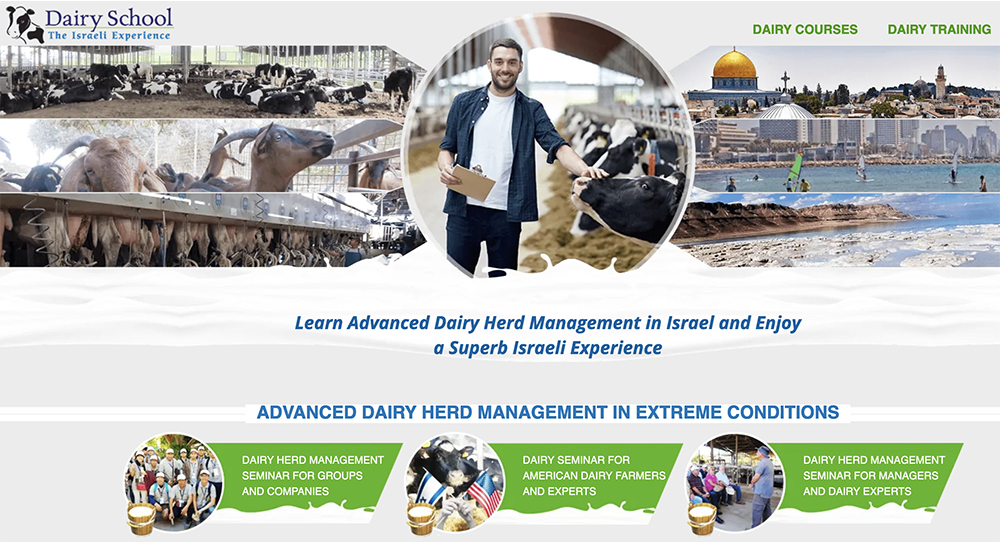As part of a drive to improve milk production worldwide and offer dairy farming practices designed to promote efficiency, one small school in Israel sets itself apart.
Using time-tested practices and cutting-edge technology, the school in a small agricultural village near the city of Nazareth in central Israel is working to enhance productivity, animal welfare, nutrition and health.
“Israeli dairy farming is number one in the world in production per cow,” says school owner, Ofier Langer, animal nutritionist and former vice-president of Afimilk. “In our school, we try to answer the question of why that is and take our participants along on the journey of how we got to that point.”
Read Also

Trump’s tariffs take their toll on U.S. producers
U.S. farmers say Trump’s tariffs have been devastating for growers in that country.
Langer began his school 12 years ago and continues to operate it modestly. The school has no fixed assets, no barns and no cows, but features a 50-member team of freelancers.
“We’re not typical. My school office is a room in my home,” Langer said. “When we take in students, we use a kibbutz (community village), hotel and many local farms. This strategy has helped us survive the COVID crisis as tourists weren’t allowed to enter Israel.”
He says the school has about 50 leading professionals, including university lecturers, managers, veterinarians, nutritionists and feed experts it draws upon to deliver training.
As students arrive teachers are matched to group needs and language capabilities.
A network of 30 farms, from small to large, commercial to family, make up the practical, hands-on portions of the flexible curriculum, which ranges from three to 10-day programs.
Typical participants are members of dairy organizations, academia, and equipment and feed companies. The school also has a working relationship with Michigan State University, which sends teams of advisers and American farmers.
“We had a dairy organization come from Japan, groups from throughout the U.S. and Europe, businessmen, companies and farmers have joined us,” Langer said. “We also work closely with European markets and feeding companies in Germany and Italy.”
Special programs cover more than 50 topics including modern management, nutrition, herd health, high yield milk under heat stressed conditions, udder health, breeding and fertility, software and marketing. The programs are balanced between lectures and dairy visits. Groups choose the ratio of schedule time they desire.
Once a year the school provides a five-day seminar for any professionals wanting to join. It features a mix of people from different countries and backgrounds. This seminar delivers a set content and agenda covering aspects from feeding to herd management, combining tools and farm visits.
“We are unique in our flexibility toward individual need,” Langer explains. “Our training is tailored to our participants’ wishes. Groups select what they want to learn about. For example, if they’re interested in heat stress management, we’ll bring in our expert heat stress team member and tour an operation where these practices are being used.”
Langer says many dairy farm managers and owners come to them having bought and installed technological systems without a full understanding of how to realize their potential, or they’re not using them to their full capacity.
Another large aspect of their training covers animal welfare and livestock handling.
“One of our basic teachings is respect and gentleness for the cows. That’s a fundamental concept in Israel and I’m constantly surprised to see many countries not following this simple yet crucial practice.”
A significant portion of what makes this school unique is it provides all transportation, meals and a variety of accommodations ranging from basic to extravagant.
The final aspect of the school, which Langer is extremely proud of, is its customized tourist attraction visits. Daytime trainings feature lectures and farm tours, but evenings offer social activities, including visits to hot-springs, religious sites and swims in the Dead Sea.
“We’re one of the only organizations in the global dairy industry using an all-inclusive approach,” Langer says. “These sightseeing ventures provide memories our students will never forget and helps them build relationships not only within their individual group but also with their clients, customers and company.”
He believes Israeli dairy farming is number one in the world for production per cow due to a combination of factors. Technological advancements are vital with at least four major companies in Israel manufacturing advanced management systems sold throughout the world.
“Technology is a major part of what we do in our country. We can’t manage a dairy in Israel without these herd management systems. Every farm, even small family operations with only 30 or 40 cows, have them. So, we teach it, and after our students see what we’re doing here, some adapt the ideas.”
Langer says when groups leave and return to their home countries, some of the curriculum will remain with them, becoming a part of how they operate.
“We’re not here to tell people what to do. We’re showing them what we do in Israel. Some aspects will stick while others won’t. Dairy farming isn’t something that can be copied and pasted.”















